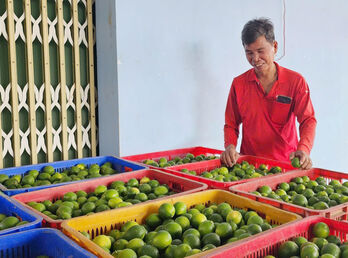
The booth of the Vietnam Trade Office in Malaysia participates in Malaysia International Halal Showcase 2024. (Photo: VNA)
Experts pointed out that the global Halal market, with its vast size and growing demand, holds significant potential for generating substantial incomes and diversifying product offerings for Vietnamese enterprises. Currently, 57 countries are members of the Organisation of Islamic Cooperation (OIC). The region is home to more than 2 billion Muslims, representing 25% of the global population, with an annual economic growth rate of 2.9%. This market has a unique business culture and often requires Halal certification for food-related industries.
The State of the Global Islamic Economy (SGIE) Report forecasts that spending on Halal products and services will reach 1.67 trillion USD by 2025, with the Southeast Asia - South Asia - Pacific region currently being the largest consumer of Halal food in the world.
Recognising the importance of the global Halal market and its potential, Vietnam has made significant efforts to develop the Halal industry. These efforts include formulating a strategic direction for the sector's development through 2030. It also includes a project to intensify international cooperation to build and develop Vietnam's Halal industry by 2030. Vietnam should also establish a National Halal Certification Centre, develop legal regulations and national Halal standards, and sign cooperation agreements with both Muslim and non-Muslim partners.
In addition, governmental agencies at both the national and local levels, as well as businesses and associations, are increasingly focused on investing in, producing, and expanding exports to the global Halal market.
To gain a firm foothold in the Halal market, experts advised that Vietnamese products, including food, beverages, and fashion, must be produced in accordance with specific processes, meeting the required standards, and certified as Halal.
Vietnam should focus on a few key strategies, including connecting localities and enterprises with Halal markets and partners around the world in priority sectors such as agriculture, tourism, textiles, pharmaceuticals, and cosmetics, they said.
Additionally, Vietnam should accelerate efforts to attract investment and technical support, and assistance in human resources training and development, while continuing to perfect state management policies related to Halal, streamlining certification processes, and promoting mutual recognition of Halal certifications, the experts suggested./.
VNA
Source: https://en.vietnamplus.vn/vietnam-needs-to-adapt-to-boost-exports-to-massive-halal-markets-post304493.vnp
 Improve cooperative operations
Improve cooperative operations



